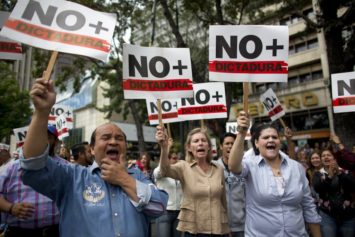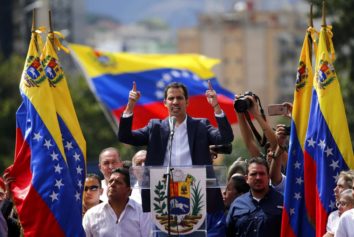Venezuelan President Hugo Chavez, who returned triumphantly to Caracas earlier this week — although he has not yet appeared publicly — is still suffering from breathing problems requiring him to be treated at a military hospital.
Venezuelans who hoped that the return of their beloved leader from Cuba after two months would mean a return to normalcy will be sorely disappointed that Chavez apparently is still suffering.
There were reports that Chavez was struggling to overcome a serious lung infection and had to breathe through a tracheal tube, making it difficult for him to speak.
Information Minister Ernesto Villegas said Chavez was continuing to receive treatment. It was the first bit of news the government has issued on his health since he came back home on Monday after leaving Venezuela on Dec. 11 for his fourth cancer operation over 18 months.
“The breathing insufficiency that emerged post-operation persists, and the tendency has not been favorable, so it is still being treated,” Villegas said in a televised statement.
The question for Venezuelans is, if Chavez is sitting up in a Caracas hospital — if in fact he is in Caracas — is he able to govern?
“Is Chavez here to die? Is Chavez here to support (Vice President Nicolas) Maduro for a new election? Is Chavez here to return to power?” Luis Vicente Leon, a Caracas-based political pollster, said in a report by GlobalPost run on Salon.com.
Some conspiracy-minded Venezuelans allege that the Castro brothers in Cuba are in fact running Venezuela behind the scenes, which has always been a longtime fear in Venezuela during Chavez’s 14 years in power — that the owner of the world’s largest oil reserves was becoming a Communist puppet.
Some Venezuelans have taken to the streets to express their displeasure. About 20 students participated in a protest outside the Cuban Embassy over the weekend, tying themselves in chains.
“His return isn’t enough,” protest organizer Gabriela Torrijos said to GlobalPost. “Chavez has arrived but has not shown us that he can govern; we need to know the truth about his health.”
Much to the annoyance of Venezuelan officials, the U.S. State Department issued a statement saying Venezuela should respect its laws and have a free vote if Chavez is deemed incapacitated. The response of Venezuelan officials was to attack the remarks of the U.S., Chavez’s sworn enemy, as a “new and ugly interference by Washington in Venezuela’s domestic affairs,” according to the news service Agence France-Presse.
An election would likely pit Maduro, Chavez’s chosen successor, against Henrique Capriles Radonski, the state governor who lost to Chavez in October’s presidential election.
Local pollster Hinterlaces on Tuesday released poll results showing that Maduro would beat Capriles by 14 percentage points, helped significantly by Chavez’s backing. Though Capriles slammed the survey, alleging the pollster was “on the government’s payroll,” observers believe the emotion brought on in the populace by Chavez’s illness or death would certainly propel Maduro to victory.


